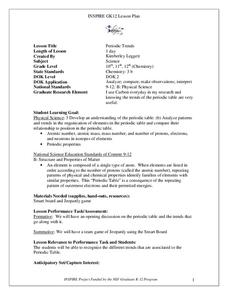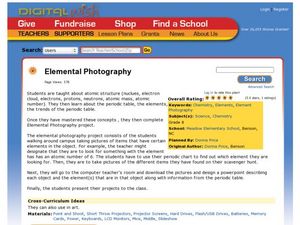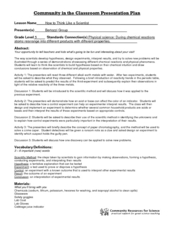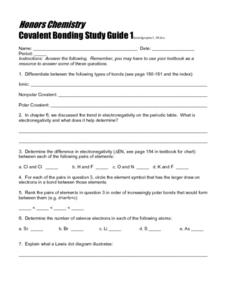Curated OER
Periodic History
Students gain a perspective in the development of chemistry. They understand some of the topics in their text and the ongoing nature of research. They then will be able to see the trends of the periodic table first hand through their own...
Curated OER
The Halogens
In this chemistry worksheet, students answer 24 questions related to properties of halogens. They fill in the table with the correct answers and participate in teacher demo.
Curated OER
Periodic Table & Its Trends
Learners review atomic structure and then participate in a activity in which they categorize several "elements" into some form of order based on their properties. They discuss the trends they see. They also practice several electron...
Curated OER
Group 13: The Boron Family
A short slide show to display the characteristics of group 13 on the periodic table of elements. The atomic structure and reasons for their physical and chemical characteristics are not explained, and so this would only be an...
Virginia Department of Education
Isotopes
Lead your class through the amazing world of isotopes as they investigate the various properties they contain and further understand their respective location on the periodic table. They explore half-lives and radioactivity as each...
Curated OER
Periodic Trends
Learners identify the different periodic trends. In this chemistry instructional activity, students discuss how elements are arranged in the periodic table. They apply what they have learned in a Jeopardy team game.
Curated OER
Organization of the Elements and Periodic Table
Students identify how to relate the position of an element in the periodic table to its atomic number and atomic mass. They also identify and interpret how to use the periodic table to identify metals, semimetals, nonmetals, and...
Curated OER
E3 Project
Students investigate excited electrons. In this chemistry lesson plan, students will go through a series of activities designed to help them understand how excited electrons emit different colors of light.
EngageNY
The Height and Co-Height Functions of a Ferris Wheel
Show learners the power of mathematics as they model real-life designs. Pupils graph a periodic function by comparing the degree of rotation to the height of a ferris wheel.
Curated OER
Kalzium
Students explore an interactive program about the periodic table. They use the Kalzium software to dynamically explore the relationships between elements, the periodic table and properties of the elements.
Curated OER
Periodic Table & Its Trends-Day 6
Students intergrate science, technology and society into exploring the periodic table. They investigate one element of their choice and write a one page paper on the elements discovery, properties, uses, and the effect on society.
Curated OER
Periodic Table
Young scholars identify the periodic table trends and predict material properties. They also design and conduct simple experiments and test material properties. Finally, students compare and contrast material properties and that...
Curated OER
Pilgrims in Style
Students explore the Pilgrims and their clothing. They discuss current trends in fashion and complete a Venn diagram comparing the Pilgrim attire to present day clothing and research websites regarding the Pilgrims. After researching,...
Curated OER
Calculating the Average Mass of the Newly Discovered Element: Bean
Students determine the average mass of a new element using masses from three isotopes. In this chemistry lesson, students explain what an isotope is. They discuss their importance and uses.
Curated OER
Atomic Electron Configuration and Chemical Periodicity
In this electron configuration and periodicity worksheet, students answer fifteen questions about periodic trends and they analyze orbital diagrams indicating location of electrons.
EngageNY
The Motion of the Moon, Sun, and Stars—Motivating Mathematics
What does math have to do with the behavior of the earth and sun? Learn how the movement of celestial bodies has influenced the development of trigonometry. Scholars connects the details in mathematics to their...
Curated OER
Elemental Photography
Eighth graders investigate objects for a specific element from the Periodic Table. In this elemental photography lesson, 8th graders observe for and object and photograph it. Students use photographs to prepare a multimedia...
Curated OER
Elements
In this elements learning exercise, students write the electron configurations for given elements. Students describe ionization energy and electron affinity and the periodic trends for both. This learning exercise has 20 short answer...
Curated OER
Groups 1 & 2, the Alkali Metals and the Alkaline Earth Metals
Giving a clear review of the basic properties of the metals in groups one and two on the periodic table, this slide show would be useful for early learners of chemistry. Your class will learn about the trends down the groups, such...
Curated OER
Electronegativity
Students identify the type of bonding between two atoms of elements given their electronegativity values. They study the trend of electronegativity across the periodic table in small groups.
Curated OER
How to Think Like a Scientist
Fifth graders study the scientific method and understand how to apply it. In this "thinking like a scientist" instructional activity students complete several activities.
Cornell University
Bacteria Take Over and Down
Bacteria outnumber all other forms of life on Earth. Scholars observe the growth of bacteria in petri dishes to understand their role in maintaining good health. Then, they observe the growth of bacteria after they introduce...
Beyond Benign
Green"er" Precipitation Reaction
All sodium carbonate may not have the same amount of carbonate, but it should have the same percent. Learners write and balance an equation to predict the chemical reaction between sodium carbonate and zinc acetate. Through the lab...
Curated OER
Honors Chemistry-Covalent Bonding Study Guide I
For this covalent bonding worksheet, students answer questions about types of bonds, electronegativity, valence electrons, and Lewis dot structures. They answer specific questions about covalent bonds in molecules and explain the...

























